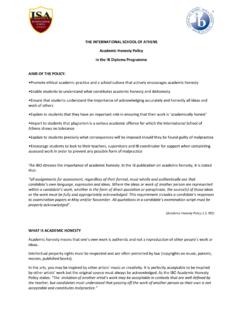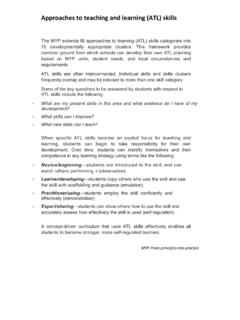Transcription of “Hamadi” by Naomi Shihab Nye - International School of ...
1 1 Hamadi by Naomi Shihab Nye Susan didn t really feel interested in Saleh Hamadi until she was a freshman in high School carrying a thousand questions around. Why this way? Why not another way? Who said so and why can t I say something else? Those brittle women at School in the counselor s office treated the world as if it were a yardstick and they had tight hold of both ends. Sometimes Susan felt polite with them, sorting attendance cards during her free period, listening to them gab about fingernail polish and television. And other times she felt she could run out of the building yelling. That s when she daydreamed about Saleh Hamadi, who had nothing to do with any of it. Maybe she thought of him as escape, the way she used to think about the Sphinx at Giza1 when she was younger. She would picture the golden Sphinx sitting quietly in the desert with sand blowing around its face, never changing its expression.
2 She would think of its wry, slightly crooked mouth and how her grandmother looked a little like that as she waited for her bread to bake in the old village north of Jerusalem. Susan s family had lived in Jerusalem for three years before she was ten and drove out to see her grandmother every weekend. They would find her patting fresh dough between her hands, or pressing cakes of dough onto the black rocks in the taboon, the rounded old oven outdoors. Sometimes she moved her lips as she worked. Was she praying? Singing a secret song? Susan had never seen her grandmother rushing. Now that she was fourteen, she took long walks in America with her father down by the drainage ditch at the end of their street. Pecan trees shaded the path. She tried to get him to tell stories about his childhood in Palestine.
3 She didn t want him to forget anything. She helped her American mother complete tedious kitchen tasks without complaining rolling grape leaves around their lemony rice stuffing, scrubbing carrots for the roaring juicer. Some evenings when the soft Texas twilight pulled them all outside, she thought of her far-away grandmother and said, Let s go see Saleh Hamadi. Wouldn t he like some of that cheese pie Mom made? And they would wrap a slice of pie and drive downtown. Somehow he felt like a good substitute for a grandmother, even though he was a man. Usually Hamadi was wearing a white shirt, shiny black tie, and a jacket that reminded Susan of the earth s surface just above the treeline on a mountain thin, somehow purified. He would raise his hands high before giving advice. It is good to drink a tall glass of water every morning upon arising!
4 If anyone doubted this, he would shake his head. Oh Susan, Susan, Susan, he would say. He did not like to sit down, but he wanted everyone else to sit down. He made Susan sit on the wobbly chair beside the desk and he made her father or mother sit in the saggy center of the bed. He told them people should eat six small meals a day. They visited him on the sixth floor of the Traveler s Hotel, where he had lived so long nobody could remember him ever traveling. Susan s father used to remind him of the apartments 2 available over the Victory Cleaners, next to the park with the fizzy pink fountain, but Hamadi would shake his head, pinching kisses at his spartan room. A white handkerchief spread across a tabletop, my two extra shoes lined by the wall, this spells home to me, this says mi casa.
5 What more do I need? Hamadi liked to use Spanish words. They made him feel expansive, worldly. He d learned them when he worked at the fruits and vegetables warehouse on Zarzamora Street, marking off crates of apples and avocados on a long white pad. Occasionally he would speak Arabic, his own first language, with Susan s father and uncles, but he said it made him feel too sad, as if his mother might step into the room at any minute, her arms laden with fresh mint leaves. He had come to the United States on a boat when he was eighteen years old and he had never been married. I married books, he said. I married the wide horizon. What is he to us? Susan used to ask her father. He s not a relative, right? How did we meet him to begin with? Susan s father couldn t remember. I think we just drifted together.
6 Maybe we met at your uncle Hani s house. Maybe that old Maronite priest who used to cry after every service introduced us. The priest once shared an apartment with Kahlil Gibran in New York so he said. And Saleh always says he stayed with Gibran when he first got off the boat. I ll bet that popular guy Gibran has had a lot of roommates he doesn t even know about. Susan said, Dad, he s dead. I know, I know, her father said. Later Susan said, Mr. Hamadi, did you really meet Kahlil Gibran? He s one of my favorite writers. Hamadi walked slowly to the window of his room and stared out. There wasn t much to look at down on the street a bedraggled2 flower shop, a boarded-up tavern with a hand-lettered sign tacked to the front, GONE TO FIND JESUS. Susan s father said the owners had really gone to Alabama.
7 Hamadi spoke patiently. Yes, I met brother Gibran. And I meet him in my heart every day. When I was a young man shocked by all the visions of the new world the tall buildings the wild traffic the young people without shame the proud mailboxes in their blue uniforms I met him. And he has stayed with me every day of my life. But did you really meet him, like in person, or just in a book? He turned dramatically. Make no such distinctions, my friend. Or your life will be a pod with only dried-up beans inside. Believe anything can happen. Susan s father looked irritated, but Susan smiled. I do, she said. I believe that. I want fat beans. If I imagine something, it s true, too. Just a different kind of true. Susan s father was twiddling with the knobs on the old-fashioned sink. Don t they even give you hot water here?
8 You don t mean to tell me you ve been living without hot water? 3 On Hamadi s rickety desk lay a row of different Love stamps issued by the post office. You must write a lot of letters, Susan said. No, no, I m just focusing on that word, Hamadi said. I particularly like the globe in the shape of a heart, he added. Why don t you take a trip back to his village in Lebanon? Susan s father asked. Maybe you still have relatives living there. Hamadi looked pained. Remembrance is a form of meeting, my brother Gibran says, and I do believe I meet with my cousins every day. But aren t you curious? You ve been gone so long! Wouldn t you like to find out what has happened to everybody and everything you knew as a boy? Susan s father traveled back to Jerusalem once every year to see his family.
9 I would not. In fact, I already know. It is there and it is not there. Would you like to share an orange with me? His long fingers, tenderly peeling. Once when Susan was younger, he d given her a lavish ribbon off a holiday fruit basket and expected her to wear it on her head. In the car, Susan s father said, Riddles. He talks in riddles. I don t know why I have patience with him. Susan stared at the people talking and laughing in the next car. She did not even exist in their world. Susan carried The Prophet around on top of her English textbook and her Texas history. She and her friend Tracy read it out loud to one another at lunch. Tracy was a junior they d met at the literary magazine meeting where Susan, the only freshman on the staff, got assigned to do proofreading. They never ate in the cafeteria; they sat outside at picnic tables with sack lunches, whole wheat crackers and fresh peaches.
10 Both of them had given up meat. Tracy s eyes looked steamy. You know that place where Gibran says, Hate is a dead thing. Who of you would be a tomb? Susan nodded. Tracy continued. Well, I hate someone. I m trying not to, but I can t help it. I hate Debbie for liking Eddie and it s driving me nuts. Why shouldn t Debbie like Eddie? Susan said. You do. Tracy put her head down on her arms. A gang of cheerleaders walked by giggling. One of them flicked her finger in greeting. In fact, we all like Eddie, Susan said. Remember, here in this book wait and I ll find it where Gibran says that loving teaches us the secrets of our hearts and that s the way we connect to all of Life s heart? You re not talking about liking or loving, you re talking about owning. Tracy looked glum. Sometimes you remind me of a minister.






